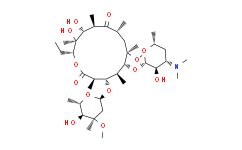Clarithromycin produces a similar concentration-dependent block with an IC50 of 45.7 μM.
Clarithromycin induces the formation of numerous intracytoplasmic vacuoles after 24?h, in all cell lines, especially in HCT116 cells. Prolonged treatment with Clarithromycin (40, 80, and 160?μM) alters cell proliferation and triggers apoptotic cell death in colorectal cancer (CRC) cells. Inhibition of cell proliferation is potentiated when Clarithromycin is re-added to the cells. In particular, 160?μM Clarithromycin, re-added after 48?h of incubation, produces an arrest of cell proliferation at 72?h. Similar effects are obtained in LS174T cells.
Clarithromycin (80 and 160?μM; 48 hours) strongly increases the LC3-II/LC3-I ratio, in a dose- and time-dependent manner, with a maximum at 24?h of treatment. This effect is accompanied by a decrease of p62/SQSTM1.
Medlife has not independently confirmed the accuracy of these methods. They are for reference only.
Cell Proliferation Assay
| Cell Line: |
HCT116 cells |
| Concentration: |
40, 80, and 160?μM |
| Incubation Time: |
24, 48, 72?hours |
| Result: |
Reduced HCT116 cell proliferation, although did not completely abolished it.
|
Western Blot Analysis
| Cell Line: |
HCT116 cells |
| Concentration: |
80 and 160?μM |
| Incubation Time: |
4, 24, 48 hours |
| Result: |
A decrease of LC3-II and a re-increase of p62/SQSTM1 were observed at 48?hours treatment.
|



 扫码关注公众号
扫码关注公众号